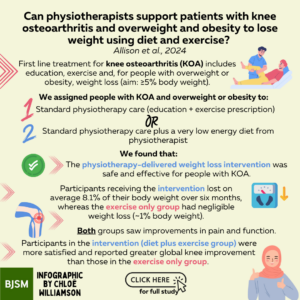Authors: Kim Allison, Jesse Pardo, Kim Bennell
This blog summarises a recently published study.
Why is this study important?
Rising rates of obesity and an aging population are contributing to an increased prevalence of many chronic conditions, creating a significant burden on healthcare systems worldwide. Alternative models of care that extend practice roles for healthcare practitioners are thought to be viable options to address contemporary healthcare needs.
Knee osteoarthritis is one such chronic condition and is a leading cause of musculoskeletal pain and disability globally. First line treatment for knee osteoarthritis includes education, exercise and, for people with overweight or obesity, weight loss (≥5% body weight being the aim). Physiotherapists are at the forefront of treatment for knee osteoarthritis as experts in lifestyle and exercise management and have an opportunity to engage in an extended role supporting patients to lose weight through additional dietary and lifestyle support.
Previous research has shown that physiotherapists can be upskilled through online self-directed training to increase their confidence in their knowledge and skills in weight management. However, prior to our study, no studies had explored the safety and effectiveness of a physiotherapist-delivered weight loss intervention.
How did the study go about this?
Six physiotherapists were recruited and underwent 20 hours of training in weight management and the dietary weight loss intervention. We then compared two interventions (treatments), where people with knee osteoarthritis and overweight or obesity received either (a) standard physiotherapy care (education and prescription of an exercise program) or (b) standard physiotherapy care plus a very low energy diet from a physiotherapist over six months.
Both physiotherapy interventions were delivered via telehealth consultation of six sessions over six months by the same physiotherapists. Participants in the very low energy diet intervention group followed a three-phase diet overseen by the physiotherapist: Phase 1 ‘Weight loss’ (12 weeks): very low energy diet comprised of two meal replacements (at no cost to themselves) and one low carbohydrate meal per day, Phase 2 ‘Transition’ (1-2 weeks): transitioning to a longer term eating plan reducing the number of meal replacements, Phase 3 ‘Weight maintenance’ (final 10-12 weeks): healthy diet.
Participants in the very low energy diet intervention group (b) followed a three-phase diet overseen by the physiotherapist, outlined in the table below. Measures of body weight and knee pain and function were collected at baseline and six months.
| Phase of diet | Description of diet in the low energy diet group |
| Phase 1: Weight loss (12 weeks) | Very low energy diet consisting of two meal replacements and one low carbohydrate meal per day. Meal replacements were received at no cost to themselves. |
| Phase 2: Transition (1-2 weeks) | Transitioning to a longer-term eating plan reducing the number of meal replacements. |
| Phase 3: Weight maintenance (10-12 weeks) | Healthy diet aligned with the CSIRO Total Well Being Diet. |
What did the study find?
The physiotherapist-delivered weight loss intervention was safe and effective for people with knee osteoarthritis and overweight or obesity, with no serious adverse events reported. Participants receiving the intervention lost on average 8.1% of their body weight over six months, meeting the desired ≥5% body weight loss suggested by clinical guidelines for the management of knee osteoarthritis, however the exercise only group had negligible weight loss (~1% body weight loss).
Both groups saw improvements in pain and function. Participants in the intervention (diet plus exercise group) were more satisfied with their program and reported greater global knee improvement than those in the exercise only group.
What are the key take-home points?
- This is the first study to show that a physiotherapist-delivered very low energy diet and exercise program was safe and effective for weight loss compared to exercise alone in people with knee OA.
- The diet and exercise group lost 8.1% body weight over six months, comparable to that achieved with dieticians in previous studies, with over a third of participants in the diet and exercise group losing over 10% body weight.
- This study provides the first proof-of-concept evidence of an alternate allied health clinician delivery model for weight loss in people with knee OA, which may guide future research and policy in the face of rising obesity rates and challenges facing healthcare systems.
